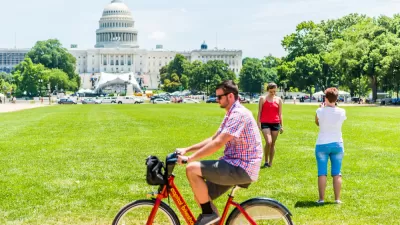As New Yorkers prepare to vote in tomorrow's mayoral primaries, Democrat Bill de Blasio's "tale of two cities" critique of the Bloomberg years has resonated with voters. But when it comes to land use, do his policies promise more of the same?
It probably won't surprise many to hear that a front-runner to be the next mayor of New York City would be friendly to real estate developers, one of the prime forces in the city's politics. But for a candidate who's campaigned on a message of reducing inequality, some view this friendliness as irreconcilable, writes Laura Kusisto. "Mr. de Blasio's pro-development policies have helped allay fears in the real-estate industry that perhaps the most liberal Democrat in the race would, as mayor, be a fearsome opponent on big developments," she notes.
"As a City Council member in the Park Slope section of Brooklyn, Mr. de Blasio was a strong supporter of the three major Bloomberg-backed development projects, including the project known as Atlantic Yards, which critics say has hastened gentrification and helped deepen the economic divide in that area," she adds. "Some liberal community groups said they feel betrayed."
"'The whole thing is a joke to us that people are looking at this guy as if he cares about the community,' said Marlene Donnelly, a member of Friends and Residents of Greater Gowanus, a group that pushed to get the Gowanus Canal designated a Superfund site—a goal Mr. de Blasio unsuccessfully opposed. 'I don't find any step of the way that he's actually been on our side here.'"
However, writing in Slate, Matthew Yglesias sees De Blasio's pro-development stance as consistent with his aim to reduce inequality. "You can try to keep Brooklyn affordable by making Brooklyn a place where nobody wants to live (Detroit is very affordable) but if it's going to be a place where people want to live, then it will only be affordable if new buildings are built."
FULL STORY: De Blasio Pushes on Land Use

Planetizen Federal Action Tracker
A weekly monitor of how Trump’s orders and actions are impacting planners and planning in America.

Map: Where Senate Republicans Want to Sell Your Public Lands
For public land advocates, the Senate Republicans’ proposal to sell millions of acres of public land in the West is “the biggest fight of their careers.”

Restaurant Patios Were a Pandemic Win — Why Were They so Hard to Keep?
Social distancing requirements and changes in travel patterns prompted cities to pilot new uses for street and sidewalk space. Then it got complicated.

Platform Pilsner: Vancouver Transit Agency Releases... a Beer?
TransLink will receive a portion of every sale of the four-pack.

Toronto Weighs Cheaper Transit, Parking Hikes for Major Events
Special event rates would take effect during large festivals, sports games and concerts to ‘discourage driving, manage congestion and free up space for transit.”

Berlin to Consider Car-Free Zone Larger Than Manhattan
The area bound by the 22-mile Ringbahn would still allow 12 uses of a private automobile per year per person, and several other exemptions.
Urban Design for Planners 1: Software Tools
This six-course series explores essential urban design concepts using open source software and equips planners with the tools they need to participate fully in the urban design process.
Planning for Universal Design
Learn the tools for implementing Universal Design in planning regulations.
Heyer Gruel & Associates PA
JM Goldson LLC
Custer County Colorado
City of Camden Redevelopment Agency
City of Astoria
Transportation Research & Education Center (TREC) at Portland State University
Camden Redevelopment Agency
City of Claremont
Municipality of Princeton (NJ)



























